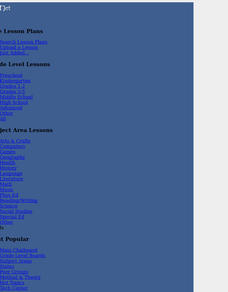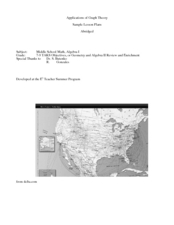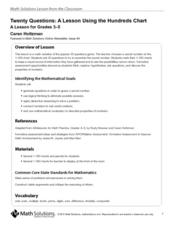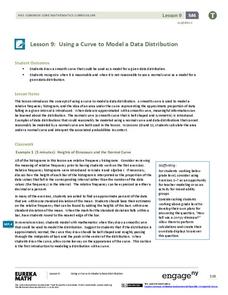Curated OER
Radial Solution, Hydrogen Wavefunction
Students study the radial solution of hydrogen activity. They illustrate eigenvalue problems in applied mathematics. Students explore Schrodinger's equation and particle wave duality.
Curated OER
Pay Day!
Young scholars apply mathematical skills to solve problems using data brought in by the Navy speaker. They use critical thinking skills to create their own story problems. Students exchange story problems among young scholars to analyze...
Curated OER
Significant What?
High schoolers define accuracy and precision, and differentiate between the two terms, apply the concepts of accuracy and precision to a given situation and correctly apply the concept of significant figures to measurement and...
Curated OER
Traveling Through the Solar System
Students use calculator and non-calculator methods for analyzing data. They apply data collection and analysis in a study of mass and weight. Students enhance and apply the concept of line of best fit. They master graphing in a plane,...
Curated OER
Real Life Challenge
Students solve word problems using words and mathematical symbols. In this algebra instructional activity, students verbalize what they do to arrive at their answers. They set up their problems algebraically as they apply their knowledge...
Curated OER
T-Shirt Lettering
Learners determine the cost of a t-shirt using a variety of mathematical operations to solve problems. Then they use a spreadsheet to calculate the cost of lettering a t-shirt and display this information in a graph.
Curated OER
Application of Graph Theory
Students investigate different online tutorials as they study graphing. In this graphing lesson, students apply the concept of graphs cross curricular and use it to make predictions. They define the purpose and theories behind graphs.
Curated OER
Developing Effective Instructional Plans and Assessments in Mathematics
Students in a teacher education program develop a technology based lesson plan. After the lesson plan is created, they develop their own performance assessment. They identify the characteristics of good assessment instruments and model...
Curated OER
Mathematical Properties
Seventh graders discuss the associative property of math. They are to find examples of the property and others. They also write in their journals about what they learned.
Curated OER
Mathematics of Scale
Students problem solve to calculate the number of times various listed objects could fit onto Tacoma Narrows Bridge. They create a scale drawing of the listed objects in comparison to the bridge.
Curated OER
Algebra Applies to the Real World? No Way!
Sixth graders examine the connections between math and real life. For this algebra lesson, 6th graders use Algepairs Cards to complete the problems presented and discuss how algebra relates the real world.
Curated OER
Mathematical Magazines
Young scholars classify and tabulate the type of advertisements found in a collection of magazines. Determination is made on what percent of the total number of ads each type represents. They present their results orally and in a graph.
Curated OER
Mathematical Magazines
Students look through magazines and calculate the percentages of the types of ads in the magazines. In this percentages lesson plan, students create a graph to show their results.
Curated OER
Mathematics in Robotics
Students build and create using math. For this geometry lesson, students differentiate between congruent and similarity as they observe polygons. They create robots with different functions using properties of geometry.
Curated OER
Saving Money Through Mathematics
Third graders discuss light sources and collect data about energy sources. They compare data and create a multiple line graph showing energy used by light sources for each student in the group. They present their graphs and write a...
Curated OER
Applied Science - Science and Math Pre - Lab (Scientific Method)
Students examine science. For this scientific method lesson, students are introduced to what every experiment contains (hypothesis, critical thinking) and how an experiment is conducted. They watch a demonstration and then work...
Curated OER
Making a Ten
An addition table supports third graders as they learn strategies to improve their math fluency. When finding sums greater than ten, students are taught how to first make a ten and then add on the rest. A similar method is also...
Curated OER
Taxes and Sales
Collaborative discussions around this retail store problem will be taxing. Calculating discount and tax and the order of the operations are used to motivate an opportunity for learners to make a convincing argument using algebraic...
Curated OER
Twenty Questions: The Hundred Chart
Use the 20 Questions game to practice math vocabulary and number properties! Project a hundreds chart and hand one out to learners. Ideally, give them counters (beans would work well) to mark off the chart so you can play multiple times....
Curated OER
Famous Public Properties
What can a middle schooler do in 90 minutes? He can practice using the commutative, associative and distributive properties of addition and multiplication. He can also simplify expressions using the commutative, associative and...
Curated OER
Multiplication: Bugs Can Multiply, So Can I!
Develop multiplication skills with your class. Youngsters will visualize multiplication as repeated addition. Then they will create a multiplication bug book and discover arrays as a strategy for multiplication problem solving....
EngageNY
Inscribed Angle Theorem and Its Applications
Inscribed angles are central to the instructional activity. Young mathematicians build upon concepts learned in the previous instructional activity and formalize the Inscribed Angle Theorem relating inscribed and central angles. The...
EngageNY
Using a Curve to Model a Data Distribution
Show scholars the importance of recognizing a normal curve within a set of data. Learners analyze normal curves and calculate mean and standard deviation.
Curated OER
How's The Weather?
Students make a box and whiskers plot using the TI-73 graphing calculator. Each student would have their own calculator but they would work in small groups of two or three to help each other enter the data and make the plots.

























